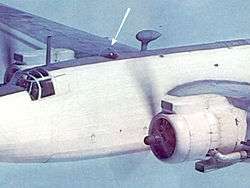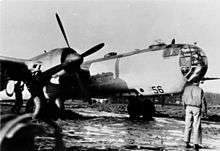Astrodome (aeronautics)


An astrodome is a hemispherical transparent dome fitted in the cabin roof of an aircraft to allow the use of a sextant during astro-navigation.[1]
Prior to the introduction of electronic means of navigation the only way to fix an aircraft's position at night was by taking star sights using a sextant in the same manner as that used by marine navigators for hundreds of years on board ships. To do this requires a 360-degree view of the horizon and the astrodome was devised to allow an uninterrupted view of the sky from horizon to horizon.
Astrodomes were prominent on many Royal Air Force (RAF) and Commonwealth operated multi-engined aircraft of the Second World War, and on foreign aircraft ordered by them for their use, such as the Liberator and Dakota, as a considerable part of the RAF's operations and other flying were carried out at night.
Similar hemispherical-shape domes were also used for sighting remotely-operated gun turrets on World War II heavy bombers - both the Heinkel He 177A, with a single forward dorsal dome to aim its remotely-operated FDL 131 twin MG 131 dorsal turret, and the complex sighting system for the American B-29 Superfortress heavy bomber's quartet of remote gun turrets used such "astrodome" enclosures for defensive turret-aiming/firing purposes.
Later use on ocean-racing yachts
In the 1950s and 60's, the use of astrodomes in aircraft was gradually phased out as radionavigation and ground plotting radars took over. Astrodomes did, however, enjoy a second career on ocean racing yachts (especially in singlehanded racing). Eric Tabarly, record-breaking winner of the 1964 OSTAR single-handed transatlantic race, and former French Aéronavale (Fleet air arm) pilot, had fitted his revolutionary lightweight ketch-rigged racer Pen Duick II with an astrodome scavenged from a Shorts Sunderland decommissioned aircraft.
Not only could he use it for sextant astro-navigation, but it provided a sheltered place from which he could steer his yacht during a stormy race. This was quite useful, as his wind-vane autopilot (also of aeronautical technology) had broken down.